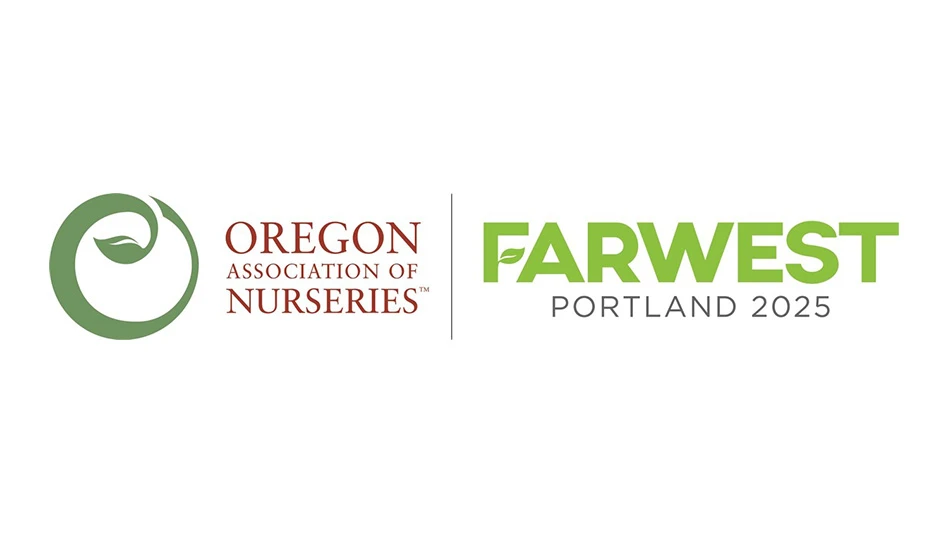 |
Darwin Perennials Day delivers amazing weather and amazing plants
By Matt McClellan
MORE THAN 350 ATTENDEES spent a sunny June day at Ball Horticultural Company’s perennial gardens for Darwin Perennials Day. The weather was perfect for the June 19 event, and the trial gardens were in fine form.
Plenty of intriguing varieties were on display, from Darwin Perennials’ 2014 introductions to woody shrubs from Ball Ornamentals. More than 30 suppliers were on hand to show their lineups as well.
There were several educational options available at the event. Information stations were set up throughout the gardens on topics like first-year-flowering and overwinter production, unique mixed container recipes, and a comparison between bareroot and liners.
Plant promoter and writer Maria Zampini, president of UpShoot LLC (and frequent contributor to Nursery Management and its sister publication, Garden Center magazine), was a guest speaker. Zampini gave an informative talk using J.R.R. Tolkien’s The Lord of the Rings trilogy of fantasy novels as a basis for how the green industry can improve communication and sales. Like Tolkien’s characters, growers, garden centers, garden writers and the industry’s professional associations all need to work together if they want to succeed.
Nursery Supplies merges with Summit Plastic
SUMMIT PLASTIC COMPANY and Nursery Supplies, affiliated companies since 2006, announced a merger designed to offer a more comprehensive assortment of their complementary products and services.
Nursery Supplies, a manufacturer in the nursery sector of the horticulture industry (tree, shrub, foliage and woody ornamentals), offers a product line from three distinct processes — blow and injection-molded and thermoformed containers ranging from trade gallon through 250+ gallons. Summit Plastic Company offers thermoformed packaging for growing, transporting and merchandising products in the color and perennial sectors.
“This is the beginning of an exciting merger that is well planned and will be carefully executed,” Norman Belliveau, president/CEO of Summit, said. “Our goal is increased service and ease of doing business for our customers. On a day-to-day basis our customers and vendors will enjoy the same strong personal relationships we have always had.”
The combination maximizes the synergies between Nursery and Summit and will service the North American market from the five Nursery and two Summit facilities.
“We are pleased to unite the strengths and best practices of Nursery and Summit to meet the demands of the marketplace, delivering the best value for our direct and distributor customers,” John Collins, CEO of the merged companies, said.
“We will improve our joint efforts by leveraging our manufacturing and customer service operations, combining product lines and creating more depth in supporting national, regional and local branding programs,” Collins added.
For more information, visit www.nurserysupplies.com and www.summitplastic.com.
.jpg) www.haitilibre.com |
USAID program results in greenhouse revolution in Haiti
A NEW METHOD OF CULTURE is taking root in Haiti. At the initiative of the U.S. Agency for International Development (USAID), a “greenhouse revolution” is bearing exceptional harvests, increasing incomes and countering environmental degradation.
The use of greenhouses is a common practice in many countries but unknown in Haiti until recently. Participating farmers who previously were ready to abandon their increasingly challenging trade, are producing larger yields and are trading their produce more efficiently and for higher profits. That bounty includes lettuce, broccoli, peppers, tomatoes, leeks, beets, carrots, strawberries and flowers such as chrysanthemums and gladioli. These are now sold locally to supermarkets, hotels, restaurants and farmers markets.
About 60% of Haitians depend on agriculture for their income. But making ends meet is difficult. And, until recently, agricultural productivity has systematically declined over the last three decades. The January 2010 earthquake prompted the government of Haiti and its partners, including the U.S. government, to put into place a new, comprehensive development strategy for guiding medium-term agricultural investments. USAID contributes through Feed the Future, the U.S. Government’s global hunger and food security initiative, as a major part of this effort.
USAID has introduced agricultural training and better technologies, rehabilitated rural infrastructure, strengthened trade and marketing skills, and established farmers’ cooperatives to be able to form partnerships between farmers’ associations, private companies and other parties.
One effective productivity booster has been the adoption of greenhouses by smallholder farmers like Dorlean. Introduced by Feed the Future West, the greenhouse model is a tunnel-like, lightweight structure made of wood, PVC pipes and a plastic cover resistant to UV rays. Some greenhouses use local materials such as bamboo for support. A water-efficient drip-irrigation system is used, while some farmers’ collectives also catch rainwater to irrigate their crops. Because the flower and vegetable pots are arranged vertically, farmers can produce more within a smaller space.
An average Haitian flower producer using traditional methods makes $170 per year on a surface of 1,000 square meters; a farmer who owns a greenhouse can generate between $1,500 and $2,500 annually, depending on the crop, on only a 70-square meter area.
A 70-square meter greenhouse typically costs about $3,000, including the greenhouse structure, pots and drip-irrigation system. So far, Feed the Future West has supported the construction of 300 greenhouses in Haiti, and several farmers associations are now funding and building their own greenhouses and providing construction training and assistance to other associations.
In addition to increasing incomes for rural Haitians, Feed the Future also helps reduce farming’s impact on water and land — precious resources on the island nation. Feed the Future West has been working with farmers harvesting vegetables, flowers and fruit to promote sustainable agriculture on hillsides by focusing on protected and vertical agriculture through small, drip-irrigated greenhouses.
Source: www.haitilibre.com
Read more at bit.ly/1a6BelY
 AJ Reynolds/OnlineAthens Armitage retires from UGA Trial Gardens |
Armitage retires from UGA Trial Gardens
THIRTY YEARS AGO, the Canadian-born Allan Armitage came to the University of Georgia faculty from Michigan. Ever since then he’s been running the UGA Trial Gardens, which he founded with UGA horticulture professor Michael Dirr.
The recent open houses at the Trial Gardens were Armitage’s last shows as director. And while he’s retiring from UGA, he’s not retiring from horticulture or from teaching, he says.
Plant breeders from all over the world send new varieties of flowering and ornamental plants to the trial garden to see how they’ll do in the South’s hot summers and sometimes chilly winters. On June 19, plant breeders and other professionals were in Athens to see what’s blooming, and the garden’s big public show was scheduled for July 13.
The UGA garden has become world-famous among both amateur gardeners and horticulture professionals — as has Armitage himself, who gets a never-ending stream of requests to speak to garden clubs, professional organizations and other groups.
If he accepted all his invitations, he’d be giving public presentations every week, says Armitage, 67, who has legions of fans in the gardening world.
The garden is also a popular place with UGA workers like Camille English, who visit regularly to have lunch in the gazebo, sit on a bench and look or wander through the garden’s paths looking at brilliant flowers with names like Aloha Kona Mango Calibrachoa, Bahia Sky Blue Bacopa and Mariposa Coleus.
Plant breeders from the Netherlands, Israel, Japan and many other countries, as well as the United States, send plants to the garden;the fees they pay finance the whole operation, which is run almost entirely by UGA students.
Always open to the public, the garden is a kind of retreat for many people. “It’s serene, but vibrant with color at the same time,” says English, a coordinator in UGA’s School of Marine Programs.
Though Armitage won’t be working at UGA or the Trial Gardens anymore, he plans on staying busy. As the author of 13 books and many more articles, he will keep on writing. Armitage will also continue to consult with a handful of companies, and he’s got his own travel company, taking gardeners to the great gardens of the world.
He’s also planning to start a gardening school with a colleague in England at a 15th-century manor house. But he’ll miss being at the garden and teaching at UGA, he says. “I’ve been able to do what I want to do,” he says.
Source: www.onlineathens.com
ePlantSource launches e-commerce platform for growers
EPLANTSOURCE has announced the launch of ePlantSource.com, an e-commerce site designed for the professional grower.
The site is live and can be viewed at www.ePlantSource.com. Visitors will have access to an online catalog with over 9,000 varieties, availability for over 22,000 products and the opportunity to place seamless orders for the 2013/ 2014 season.
ePlantSource welcomes visitors to visit the site, register and place orders. Additionally, the team is ready via live chat (www.ePlantSource.com/support), phone (855-674-8440) or e-mail (CustomerService@ePlantSource.com) to answer any questions.
Gary Falkenstein, president/CEO of ePlantSource, says he is excited to be taking the business online.
“I would like to invite everyone to come to our site and check us out,” he says. “See what ePlantSource has to offer with our quick and reliable system that organizes the information and puts it right at your fingertips.
“We like to think that we are taking a lot of the work out of your order management experience,” Falkenstein adds.
ePlantSource is powered by a dedicated team of industry, systems and marketing professionals.
To learn more visit www.ePlantSource.com/Home/About.
Metrolina Greenhouses to purchase Stacy’s assets
METROLINA GREENHOUSES, based in Huntersville, N.C., announced that it has entered into a purchase agreement to buy the assets of Stacy’s Greenhouses, Inc. pending U.S. bankruptcy court approval.
Upon completion of the transaction, combining Stacy’s quality product and exceptional people with Metrolina’s expertise in logistics, marketing, and automation will lead to sales growth for their retail partners as well as business growth for the combined entity, Metrolina states.
Abe VanWingerden, co-CEO of Metrolina Greenhouses, adds, “As part of Metrolina’s continuing expansion, the proposed asset acquisition of Stacy’s will improve our business growth as we continue with our 2025 Vision plan. Stacy’s perennial business is a natural addition to our current product lineup as we continue to provide new and innovative solutions and concepts for our retail partners. Additionally, by making this asset purchase, we will be able to honor and extend the business legacy of Mr. Stacy as he and my father, Tom VanWingerden, were both pioneers in this industry who worked together on many projects over the years as they both started in their businesses in the early 1970s. Combining the work of these two visionary leaders into one company makes logical sense.”
The asset purchase agreement was entered into on June 21, 2013, and is subject to approval of the U.S. Bankruptcy Court in South Carolina. Subject to the auction process and court approval, the parties anticipate the transaction will close in approximately 60 days.
With fiscal year 2012 sales of $141 million, Metrolina Greenhouses, Inc. serves approximately 1,000 retail outlets annually with its live goods product mix. The company was founded in 1972 and is based in Huntersville, N.C.
For more information, visit www.metrolinagreenhouses.com
Online florist implements farm-to-home delivery
A NEW ONLINE FLORIST, 30Bouqs.com Inc., has raised $1.1 million in seed funding to disrupt an industry that the company says is ripe for innovation.
The financing round was led by Quest Venture Partners and Siemer Ventures, with participation by investors Mich Mathews, former chief marketing officer at Microsoft; Institutional Venture Partners partner Dennis Phelps; Bonobos Chief Executive Andy Dunn; and Trunk Club CEO Brian Spaly.
The Los Angeles startup, known as Bouqs Co., will use its seed money to hire new marketing and tech talent and to move into permanent offices, says founder and CEO John Tabis.
“The incumbents out there are huge,” Eric Manlunas, co-founder and managing partner at Siemer Ventures, says. “And a few startups have popped up. But we haven’t seen innovation in this space for a long time.”
Manlunas says the startup, co-founded by Tabis and floral farming expert JP Montúfar, is disrupting floral delivery by “shrinking the supply chain, going from farm to home, and offering honest, transparent pricing.”
He notes that well-established floral delivery sites in North America like 1-800-Flowers, FTD and Teleflora charge variable amounts based on different types of flowers, primarily. They also add shipping fees and may “upsell” their users on items like teddy bears or food.
Bouqs offers flat pricing of $40 per bouquet shipped anywhere in the U.S. The company cuts flowers one day after an order comes in, sourcing them from four farms in the Ecuadorian Andes, some of which are Rainforest Alliance-certified, according to the CEO. It ships flowers directly to recipients, rather than to florists who may refrigerate a bouquet for days before delivering it.
With its direct-to-home approach, Bouqs is able to charge a flat fee on both the bouquet and shipping, which “makes the checkout process predictable and easy” for site users, Tabis says. He believes this user experience will appeal to younger, tech-savvy consumers who may not yet be in the habit of sending flowers.
Source: Wall Street Journal
 Michael Geary walks with delegates at Piante Faro Nursery, Catania, Italy, during the international roundtable event. |
First international roundtable for horticulture industry calls for cooperation, action
HORTICULTURE INDUSTRY leaders from around the world gathered in Italy June 23 to 26 for a meeting on horticulture industry concerns. The purpose of the meeting was to discuss national and global issues around plant production and distribution. ANLA’s and OFA’s chief executive, Michael Geary, represented the United States.
Over the course of three days, delegates from 19 countries discussed common concerns and ideas on issues like disease and pest management, improving national and international country trade, government regulations, trade shows, staffing (including immigration/temporary labor programs), and the importance of flowers, plants and trees for healthy living and working environments.
The European Nurserystock Association hosted the summit, and trade association executive directors and producers from large and small countries, including Canada, Poland, South Africa, The Netherlands and the United Kingdom, participated. The outcomes of the meeting included a more collegial environment among the countries for ongoing dialogue on industry matters, sharing best practices, and an expressed desire for collaboration on research.
“With a collective effort, our industry can deliver the maximum benefit of flowers, plants, and trees,” says Geary. “The roundtable of industry representatives was an important step toward solving our national and international problems, and developing a worldwide effort to promote the value of our products and services.”
Speaking after the inaugural meeting, Maurizio Lapponi, president of the European Nurserystock Association (ENA) and representative from Italian Exporters Nurserystock Association, said, “Nurserymen across the world are facing similar challenges and opportunities. ENA recognized this fact and decided to arrange the first worldwide roundtable where producers and industry associations could come together to discuss challenges and consider ways to address them.”
At the conclusion of the roundtable, a formal statement from the delegates was agreed to and issued. Along with acknowledging the benefits of plants and trees to society, the statement calls on the world’s governments to help educate people on the benefits of plants and invest additional public funds in plants and the industry because this will play a key role in the long-term health of the environment.
Source: OFA
All-America Selections showcases perennials program for growers
JUST IN TIME for the fall perennial program and in advance of the 2014 spring annual season, All-America Selections (AAS) is showcasing a perennials program in conjunction with printed pots featuring the AAS logo and program description. The pots will let consumers locate award-winning perennials at their local garden retailers.
The six winners selected for inclusion in the perennial program have been tested and trialed in more than 25 different trial locations throughout North America and have been proven to have outstanding garden performance. The three classes featured in the program are well-known to consumers and in are in the top 10 most popular perennials, meaning quick acceptance by consumers, AAS says.
For growers doing a traditional over-wintered perennial program, the printed pots will be available if ordered before September 15, 2013. For annual growers wanting to offer perennials as part of their color assortment, all six of these varieties are first-year flowering perennials and can be shipped in flower, and since color sells at retail, this means a quicker turnover and higher sales.
Winners range from the 2002 winner, Rudbeckia hirta ‘Cherokee Sunset,’ to the most recent 2013 winner, Echinacea ‘Cheyenne Spirit.’ All feature the beautiful rayed petal flowers so popular with today’s gardeners and will return year after year for continuing garden impact. Growers and brokers can plan now to include these six AAS winners in their perennial programs for 2014, creating a collection of award-winning perennials with proven garden performance.
AAS printed containers are now available in two sizes from Summit Plastic. Growers and garden centers can choose the red, white and blue pots in either the 1-qt. or 2.5-qt. size. Minimum quantities must be met, and orders must be placed by September 15, 2013.
AAS is also offering similar programs for container edibles.
Source: AAS
FOR MORE INFORMATION on these AAS programs, visit bit.ly/1atXlGE.
MSU offers Floriculture Root Zone Mmgt. course
THE MICHIGAN STATE UNIVERSITY Extension Floriculture program is offering the first in a series of online courses.
The first course in the series being offered is Floriculture Root Zone Management. The course will provide practical information on managing the root zone of container-grown greenhouse crops and covers the topics of irrigation water, including water sources, water quality, water treatment, and irrigation timing and methodology; growing media, including the physical and chemical properties of media, as well as substrate components and amendments; and nutrition, including how to select fertilizers and monitor nutrition.
For more bit.ly/17lgrt6
OFA Short Course to expand in 2014 with 50K square-foot exhibit hall
THE ASSOCIATION OF HORTICULTURE PROFESSIONALS announces a significant expansion of OFA Short Course, the convention and marketplace that every year attracts thousands of industry professionals. Already ranked as one of the largest events in North America among all industry and consumer trade shows (according to 2012 ranking by Trade Show News Network), the convention will grow next year by adding a 50,000 square-foot exhibit hall to host more companies that sell products and services to garden retailers. Additional educational and networking opportunities will also be offered to serve the increasing attendance.
“For years, OFA Short Course has been a preferred destination for independent garden retailers, florists, growers, and installers. Our 7-acre trade show sells out every year, and it already includes numerous companies that provide products and services to retailers,” says Sherry Johnson, OFA’s trade show manager. “There is great demand for us to offer more exhibitors and activities for retailers and others.”
Michael Geary, OFA’s and ANLA’s chief executive says, “When ANLA and OFA combine, our new organization will become the world’s largest trade association of independent garden retailers. The premier event needs to reflect the make-up of our membership and the industry, and offer one-stop buying and selling for goods and services.” The OFA Short Course currently includes exhibitors that provide hard goods, plants and business services for growers, retailers and installers, and comprehensive education on business management, marketing and greenhouse and nursery production.
“The reality is that for most retailers, plants can make up as much as 80 percent of annual sales. At Short Course, attendees can see new varieties and other plants that consumers want to buy. But it’s not plants alone that retailers sell, so we also offer a wide assortment of hard goods and services to round out their inventory. In 2014, this product category will expand with the addition of another exhibit hall,” says Geary. “Retailers will get everything they need at this event along with our year-long support.”
Improving business management skills and networking with peers is also important, according to Kate Terrell of Wallace’s Garden Center in Bettendorf, Iowa. “It’s important that retailers and growers — the entire industry supply chain, in fact — be together under one roof. We can learn from each other and do business. Why segregate ourselves into separate events?
“Some of the best education for retailers is offered by OFA and ANLA, and we will offer more beginning in 2014 with the consolidation of the organizations and the expansion of the convention next July,” adds Terrell, who serves as chair of OFA’s Garden Center Committee.
ANLA and OFA are preparing to consolidate into one new trade association by 2014. OFA Short Course will reflect this change by also increasing the number of companies that supply the nursery and landscape markets.
A not-for-profit event since 1930, OFA Short Course is produced every July in Columbus, Oh. One of the nation’s largest cities, Columbus is considered to be an affordable destination for visitors and is conveniently located within 550 miles of half the U.S. population. As of late, the city has been garnering national recognition as a vibrant, free-spirited destination. Its food scene, creative energy and attractions have all earned praise from travel writers and visitors alike.
Sales for the new exhibit hall are scheduled to begin late summer.
Source: OFA
FOR MORE INFORMATION, visit ofa.org/retail
FNGLA celebrates success at 13th annual convention
THE FLORIDA NURSERY, GROWERS AND LANDSCAPE ASSOCIATION (FNGLA) held its annual convention June 14-15 at the Bonaventure Resort in Weston. The two days of activities culminated with the association’s Annual Meeting followed by the evening’s Presidents Gala, where FNGLA service and dedication was celebrated.
Each year, FNGLA honors a distinct group of individuals who contribute time and energy into enhancing, protecting and serving Florida’s nursery and landscape industry through the FNGLA Industry Awards Program.
FNGLA’s Industry Awards Program acknowledges both FNGLA and industry service — with varying criteria geared for each award. Nominations were accepted from the industry at large, and winners were selected by a committee of industry peers.
The Wendell Butler Award and the FNGLA Hall of Fame are recognized as the most prestigious awards given by FNGLA. The Wendell Butler Award is presented for service to FNGLA and the FNGLA Hall of Fame Award is a lifetime achievement award. Nominations are accepted each year from the industry at large.
 |

Explore the August 2013 Issue
Check out more from this issue and find your next story to read.
Latest from Greenhouse Management
- CEA Alliance celebrates bipartisan introduction of Supporting Innovation in Agriculture Act
- Dümmen Orange North America celebrating 25th anniversary in 2025
- Illinois Landscape Contractors Association changes name to Landscape Illinois
- 2025 Proven Winners Horticulture Scholarship applications now open
- ICL’s Gemini Granular herbicide now registered for use in California
- Eurazeo Planetary Boundaries Fund acquires Bioline AgroSciences
- Spring Meadow Nursery's Freedom Shelley finds joy in plants
- Leading Women of Horticulture: Dana Massey, Plantworks Nursery






